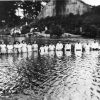calsfoundation@cals.org
James Francis Drane (1930–2023)
James F. Drane was one of the founding figures of biomedical ethics. He was a Roman Catholic priest and professor of philosophy at St. John’s Seminary in Little Rock (Pulaski County) when he was expelled from the Catholic Church for his liberal criticism of its positions on contraception. Partly because of his mastery of the Spanish language, he played a crucial role in establishing the field of biomedical ethics in Spanish-speaking countries.
Jimmy Drane was the eldest of ten children of James and Anna Drane. He was born on April 6, 1930, in Ridley Park, Pennsylvania, and was raised in a nearby town, Chester, where he graduated from St. James High School in 1947.
Feeling a calling to the priesthood, he continued his education by going to St. John’s Seminary in Little Rock. In 1951, he was sent to Rome, Italy, to pursue a theology degree from the Gregorian University, which he received in 1953. The following year, he returned to Little Rock, and was ordained a Catholic priest in 1956. While working as a priest, he pursued further graduate study at Middlebury College in Vermont and the Complutense University in Madrid, Spain, where he received a master’s degree in Spanish and a PhD in ethics.
As a priest at St. John’s Seminary in Little Rock, Father Drane’s main assignment was teaching at the seminary. He was also sent to serve as a priest at a hospital in the Arkansas/Texas border city of Texarkana (Miller County). It was there that, in 1966, a nun led a young couple to his office. The couple had more children than they could care for and did not want more, and the Church’s strict ban on contraception caused significant difficulties in their marital life. The young priest tried to explain and justify the position of the Catholic Church, but a few days later, he was shocked to hear that the couple had broken up.
As a result of this experience, he began reconsidering the Catholic Church’s teachings on sexuality and birth control. He formed groups of couples with similar problems to discuss them, and when another couple broke up for a similar problem, Drane wrote a series of columns in the Arkansas Gazette in the summer of 1966 criticizing the Church’s positions on artificial contraception. The columns attracted a lot of attention and were republished in other newspapers all over the United States. Soon afterward, the assistant of Bishop Albert Fletcher informed Drane that he was expelled from the priesthood and had to leave his job and residence in the seminary.
After his 1967 expulsion from the priesthood, Drane moved to Yale University, where noted theological ethicist James M. Gustafson gave him refuge and invited him into his intellectual circle, which included many of the future founding figures of bioethics. Among them was Daniel Callahan. Drane and Callahan began a project that involved traveling around the world to explore international ethical perspectives on abortion. After their return in 1969, Callahan established the Hasting Center, the first major research institute dedicated to bioethics in the United States.
Drane, however, followed a different path. When he was returning from a long trip, a snowstorm forced the plane he was traveling on to land at the airport in Erie, Pennsylvania. He met the president of nearby Edinboro University and was invited to accept a job as a full professor at the university (now known as the Edinboro campus of PennWest University). He started this job in 1969 and continued working there until his retirement in 1992. Even after his retirement, he continued his scholarly endeavors as a professor emeritus and the founding director of the James F. Drane Bioethics Institute. The institute’s main funding source was a donation from Drane’s friend Russell B. Roth, a lifelong Erie resident and prominent urologist who was the president of the American Medical Association in 1973 and 1974.
Drane’s career as a bioethicist centered around appealing to virtue ethics to promote what he called “more humane medicine” based on the relationship between healthcare providers and their patients. He expressed his concern about the medical professions becoming mere jobs rather than callings requiring a genuine moral commitment to patients.
Drane remained a forthright liberal Catholic who was known for his thoughtfulness, gentleness, and moral courage. He published hundreds of articles, book chapters, and professional presentations, as well as dozens of books in Spanish and English, including The Possibility of God (1976), Religion and Ethics (1977), Becoming a Good Doctor (1989), Making Life and Death Decisions for Others (1991), Clinical Bioethics (1994), and More Humane Medicine (2003). In 2002, he was named one of the founders of the discipline of bioethics at the International Bioethics Conference in Brasilia, Brazil.
Drane continued his productive scholarly work until mid-2023, when he left his workplace and home in Edinboro to reside in Saint Mary’s, a facilitated living institution in Asbury Ridge, Pennsylvania. He died on April 17, 2023, and is buried in Edinboro.
For additional information:
Drane, James. “The Shepherd’s Lost, and the Flock Knows It.” Arkansas Times, October 28, 1993, pp. 19–20.
———. “Repent! Who, Us?” Arkansas Times, July 1980, pp. 23–24, 31–32.
Fins J. J., and K. S. Shulman. “Remembering James F. Drane.” Hastings Center. https://www.thehastingscenter.org/remembering-james-f-drane/ (accessed May 31, 2024).
James F. Drane Bioethics Institute. https://www.edinboro.edu/academics/institutes/bioethics-institute/index.php (accessed May 31, 2024).
Shulman, K. S., and J. J. Fins. “Before The Birth of Bioethics: James M. Gustafson at Yale.” Hastings Center Report 52 (March–April 2022): 21–31. Online at https://doi.org/10.1002/hast.1352 (accessed May 31, 2024).
Sullivan, S. J., and K. Aramesh. “James F. Drane (1930–2023).” American Philosophical Association. https://www.apaonline.org/page/memorial_minutes2023 (accessed May 31, 2024).
Timms, O. “Encounter with a Legend: Dr. James F. Drane.” Indian Journal of Medical Ethics 5 (April 25, 2020): 152–155. Online at 10.20529/IJME.2020.035 (accessed May 31, 2024).
Kiarash Aramesh
The James F. Drane Bioethics Institute
PennWest University







I remember Jim Drane–a wise, caring, humane, and unusually thoughtful man. And funny. He once took a visiting priest on a weekend visit to the Hot Springs Alligator Farm. All the gators seemed to be sleeping in the big pool. It was boring. He got a broom from a closet and went around gently whacking the lazy gators on the snout. Suddenly the pool was full of thrashing, snapping critters. He was expelled–a specialty of Jim Drane.